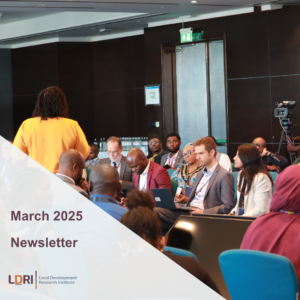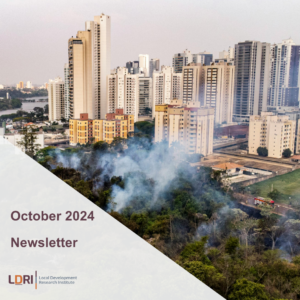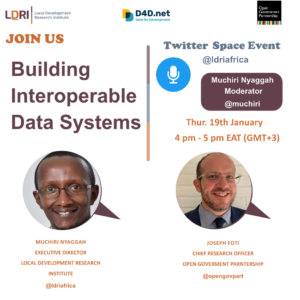![]()
WEBINAR: Exploring the Utility of The Global Data Barometer(GDB) for Sub Saharan Africa
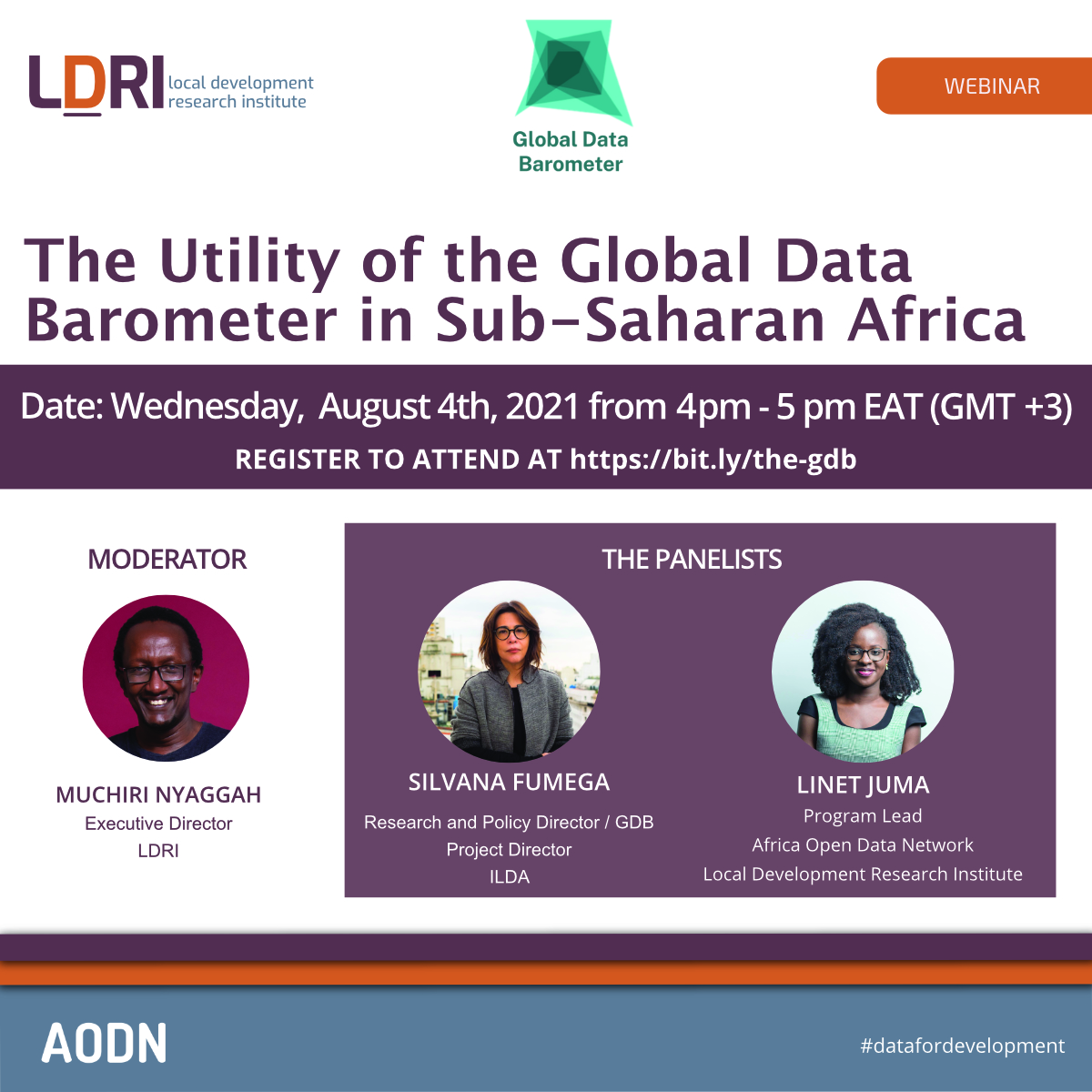
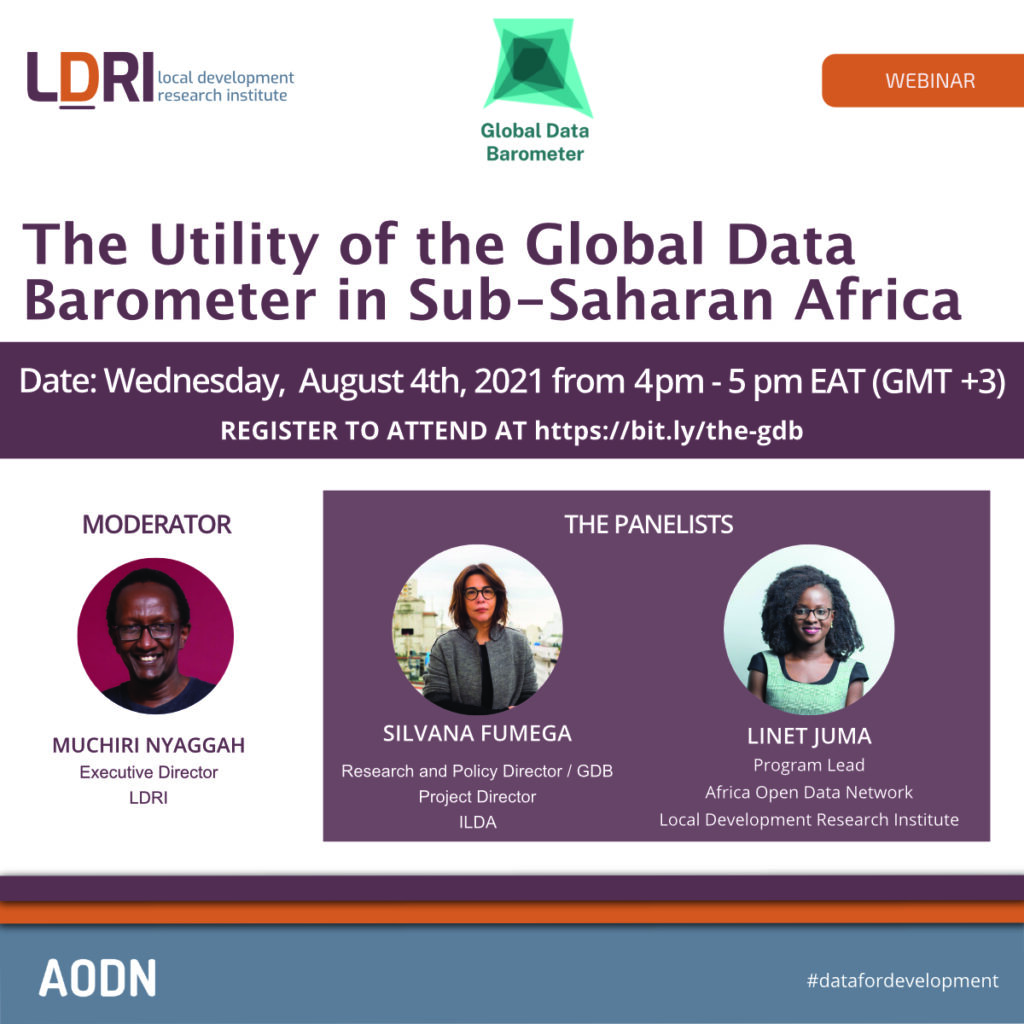
The Global Data Barometer (GDB) is a new global data index that seeks to provide updated, in-depth, country-level insights on data policy and practices across the globe. With data from over 100 countries, the GDB will fill critical knowledge gaps on how data policy and practice are unfolding in different sectors, regions, and countries around the world by providing a flagship global report, an open research-ready dataset, regional and sectoral analysis, and country profiles. These outputs will help add to the understanding of the ongoing data transformation, provide a critical new comparative benchmark on data, contribute to in-depth quantitative and qualitative research on data and support sectoral efforts with actionable insights.
The GDB is coordinated through a network of regional research hubs. The Local Development Research Institute (LDRI) through its Africa Open Data Network (AODN) Program is coordinating the Africa hub, conducting and overseeing research across 24 countries including; Angola, Benin, Botswana, Burkina Faso, Gambia, Côte d’Ivoire, Mozambique, Ethiopia, Ghana, Kenya, Liberia, Malawi, Morocco, Namibia, DR Congo, Nigeria, Rwanda, Senegal, Cameroon, Sierra Leone, South Africa, Tunisia, Togo, and Uganda.
Against this backdrop, LDRI and the Global Data Barometer organized a webinar on the Utility of the Global Data Barometer(GDB) for Sub-Saharan Africa exploring the GDB and what it means for different actors in Sub-Saharan Africa. The session sought to provide participants with a better understanding of the GDB and its utility and implications for different stakeholders in Sub-Saharan Africa. In the panel was Dr. Silvana Fumega, Project Director, GDB and Research and Policy Director of ILDA, and Ms. Linet Juma, Regional Coordinator, GDB and Program Officer, LDRI.
This blog shares some of the key highlights of the discussion:
According to Silvana, there is an opportunity to improve the use of public data for public good. Even though public data has been more accessible in the last decade, it is not clear how well data is deployed as a resource for tackling social change, enabling collaboration, driving innovation, and accountability. Without a benchmark, stakeholders lose track of the key issues that affect policymaking and innovation. The GDB was set up to fill this gap by tracking how data is shared and used for the public good. The index seeks to fill critical knowledge gaps on how data policy and practice are unfolding in different sectors, regions, and countries around the world.
What Stakeholders in SSA should look out for from the GDB
The ability and capacity to monitor progress and swiftly adapt resources and policies accordingly is critical for African governments to effectively implement regional and global development plans. This is underpinned by the availability and use of comprehensive and timely data and evidence.
With just a few years left to achieve the First Ten-Year Implementation Plan (2014-2023) of the African Union’s Agenda 2063, and the 2030 Agenda and its Sustainable Development Goals (SDGs); there is a need for data and evidence to drive Africa’s development agenda.
In her presentation, Linet explored how the data and evidence provided by the GDB’s outputs, the flagship global reports, regional and sectoral analysis, and country profiles, an open research-ready dataset, and a qualitative case study library, can be used by different stakeholders across Sub-Saharan Africa to drive Africa’s development agenda.
The flagship global report will provide a critical new benchmark on country-level data governance, data capability, data availability, and data use for the public good. The report will help different stakeholders understand how different issues, especially across the four pillars; data governance, data capabilities, data availability, and data use and impact, manifest themselves across the 24 countries in Sub Saharan Africa. The report will also provide a basis for driving data for development that advances the governance and use of data as a tool to deliver the 2030 Agenda for Sustainable Development. Generated evidence is anticipated to inform interventions to be taken up by institutions, individuals, organizations implementing different initiatives seeking to improve socio-economic development outcomes.
Secondly, the GDB will provide regional, and sectoral analysis and country profiles. These seek to provide actionable insights on how data is working in specific sectors. This will enable stakeholders to see and compare how data is manifesting itself in different sectors, opportunities for cross-learning across sectors, and to identify potential entry points for stakeholders implementing country and sector-specific initiatives.
The GDB will also support critical research across Sub-Saharan Africa by providing an open research-ready dataset, methodology, and research tools under an open license. This will drive improvements in research on data governance, capability, availability, and use, and support the creation of research papers and reports in Sub-Saharan Africa.
Lastly, the qualitative case study library will help surface context-relevant use cases and best practices on existing data governance frameworks, available datasets, and use cases across multiple countries and sectors. This is one of the biggest ways of encouraging cross-learning and uptake of data initiatives.
Download our panelist’s presentations below:
Watch the full discussion here
ReferencesAddressing the Data Gap in Africa to Ensure Progress towards Achieving Agendas 2063 & 2030. Mo Ibrahim Foundation, 2020. mo.Ibrahim.foundation/news/2020/addressing-data-gap-Africa-ensure-progress-towards-achieving-agendas-2063-2030

